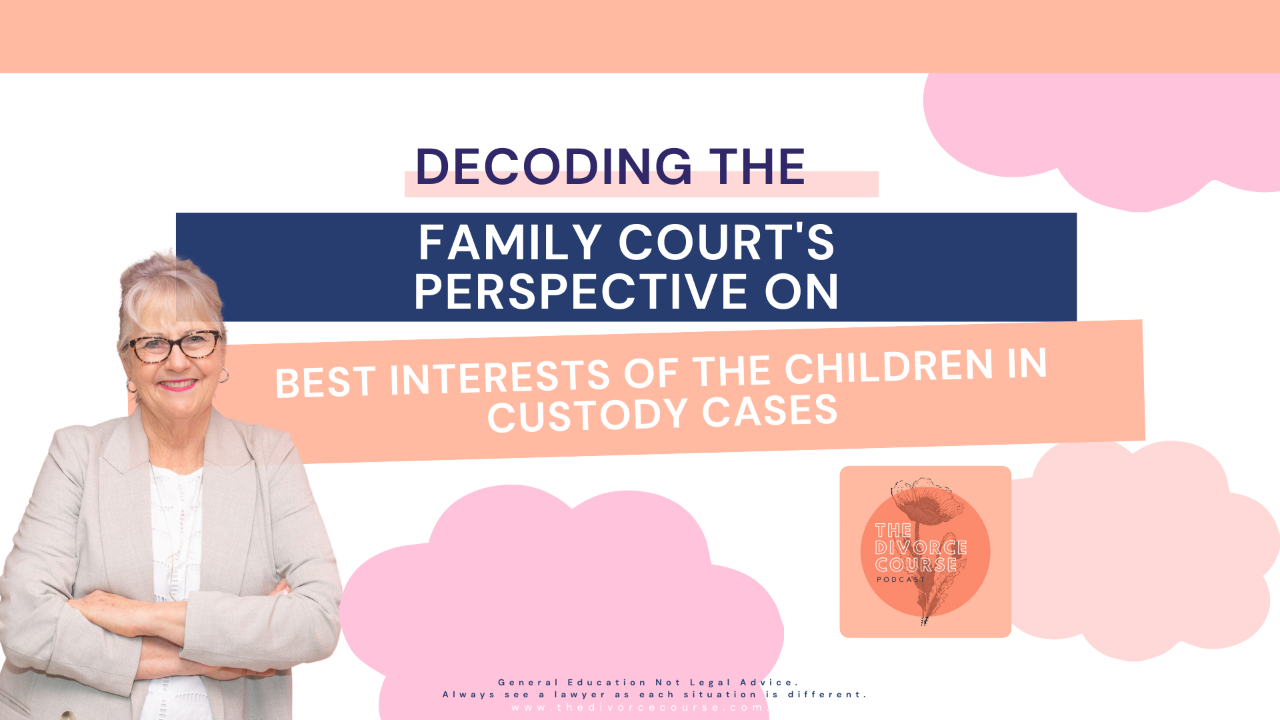What does Best Interests of the Children Mean in the Family Court.

For many divorcing parents, the primary concern revolves around their children. Questions like, "What will happen to them? What do the courts say about it? What's genuinely best for them? This posts aims to help you understand the concept of "the best interests of the children" as viewed by the Family Court.
Please also see a lawyer as each situation as different the information below is for educational purposes only.
So, what exactly do we mean by "the best interests of the children"? The courts consider this as the paramount consideration in any family law matter involving children. However, the Family Law Act of Australia provides specific guidelines and considerations. The primary factors include:
- Meaningful Relationship with Both Parents: The court emphasises the importance of the child having a meaningful relationship with both parents.
- Protection from Harm: Equally significant is the protection of the child from physical, emotional, and psychological harm.
Balancing Act: Often, cases revolve around striking a balance between these two primary considerations. While the court aims to facilitate a child's relationship with both parents, they must ensure the child's safety and well-being.
Domestic Violence Orders: Contrary to what many believe, having a domestic violence order does not guarantee that the court won't require the child to spend time with the other parent. The court's priority is to ensure the child's safety while promoting their relationship with both parents.
Additional Considerations:
In addition to the primary considerations, the court takes into account various factors, such as:
- Child's Views: Depending on their maturity and the circumstances, the child's views may be considered. Age is not the sole determining factor.
- Child's Relationship with Parents: The court assesses the child's relationship with each parent.
- Involvement in Decision-Making: The extent to which each parent has been involved in decision-making and spending time with the child is examined.
1. Practical Difficulties: One essential consideration is the practical aspect of parenting arrangements. Think about factors like work commitments, distance between parents' homes, and the logistics of getting children to school and extracurricular activities. The court recognises that what works for one family may not be suitable for another.
2. Financial Matters: Don't fret if your ex-partner earns more than you do. Child support is designed to ensure that children's financial needs are met. The court doesn't automatically favour the wealthier parent when it comes to custody decisions.
3. Mental Health and Behaviour: The court takes into account the mental health and behaviour of both parents. If one parent struggles with mental health issues or displays concerning behaviour, it could impact their ability to provide emotional stability for the child.
4. Cultural Considerations: If a child has a specific cultural heritage that needs to be preserved, the court may consider this when making decisions about their upbringing. It's essential to advocate for the child's cultural identity if it's a significant factor.
5. Responsibility and Engagement: How each parent fulfils their responsibilities and engages with their children is vital. The court pays attention to whether a parent is genuinely interested in parenthood or is merely putting on a facade when legal proceedings are underway.
6. Family Violence: Any history of family violence, whether between parents or involving children, is taken seriously. The court will consider the safety and well-being of the child when determining custody arrangements.
7. Avoiding Ongoing Litigation: The court aims to minimise constant legal battles that can be harmful to children. Long-term, contentious proceedings can have a negative impact on kids, so the court seeks to make orders that reduce the likelihood of further litigation.
8. Preparing for Changes: Be aware that family law is evolving. While the concept of equal shared parental responsibility and equal time arrangements is currently in place, legislation may change. Stay informed about legal updates to navigate your case effectively.
9. Focus on the Child: Remember that the court's primary concern is the well-being and best interests of the child. Any decision made should prioritise their emotional, intellectual, and social needs.
10. Primary Carer Label: Avoid fixating on labels like "primary carer." Focus on the quality of your relationship with your child instead of trying to fit into predefined roles.
11. Unfit Parent Label: Don't get caught up in the outdated notion of being labeled an "unfit parent." The court evaluates each case based on its unique circumstances, rather than applying generalised labels.
Taking Action:
- Starting Right: Begin spending time with your children right from the outset of separation. It's generally easier to establish this from the beginning rather than attempting to change the status quo later on.
- Open Communication: Inform your children about the separation in an age-appropriate manner to prevent them from creating worse scenarios in their minds.
- Child Support Payments: Timely child support payments reflect positively on your commitment to your children.
- Practical Effects on Children: Consider how changes may affect your children's routines and their overall well-being.
- Special Needs: If your child has special needs or neurodiversity, these unique requirements will be considered.
- Seek Legal Advice: If you're navigating divorce and child custody matters, it's crucial to consult with a family law attorney. They can provide you with personalised guidance based on your specific situation.
In conclusion, while the process of divorce and child custody can be emotionally taxing, understanding the factors that the court considers can help you prepare and make informed decisions. Remember, the best interests of the children should always be at the forefront of your decision-making process.
To learn more about this listen to our podcast episode called Decoding the Family Courts View Of Best Interests of the Children.
Come along to our next free webinar
Stay connected with news and updates!
Join our mailing list to receive the latest news and updates from our team.
Don't worry, your information will not be shared.
We hate SPAM. We will never sell your information, for any reason.

